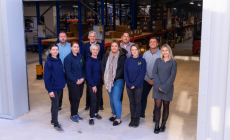-
Nulogy Introduces the Manufacturing Operating System - February 27, 2026
-
Bliss Direct scales to 300 daily orders and saves 25 hours per week with Forterro’s Orderwise ERP - February 25, 2026
-
Wootzwork raises $6.6M to bring predictability to offshore manufacturing - February 25, 2026
-
Rite-Hite unveils new range of hydraulic kits to upgrade and extend dock leveller performance - February 19, 2026
-
REWE and Cimcorp automate fresh supply chain for Berlin supermarkets and stores - February 19, 2026
-
Q1 – A recovery period or time to fix, switch and scale? - February 19, 2026
-
NULOGY’S SHOP FLOOR SOFTWARE TO POWER COMPLETE CO-PACKING’SOPERATIONS - February 13, 2026
-
Why lead generation depends upon good content - February 13, 2026
-
Wallapop and Albatross Sign Strategic Partnership to Bring Real-Time AI Discovery to the Future of Consumer-to-Consumer Commerce - February 12, 2026
-
Thorworld ramp helps Hubergroup to streamline its unloading operation - February 6, 2026
DRIVER SHORTAGE THE BIGGEST CHALLENGE FACING THE ROAD TRANSPORT SECTOR IN 2018 SAYS PARAGON SURVEY.
The ongoing driver shortage is by far the most significant challenge facing the road transport sector in 2018 and a growing cause for concern amongst logistics operations according to the findings of Paragon Software Systems’ annual UK customer survey. Almost half of all respondents (46.4%) stated that the lack of drivers and other skilled workers across the industry was the biggest barrier to success, up by over a third (36.8%) when compared to the previous year’s results.
When asked what the logistics sector needs to be doing to attract young talent there was a broad range of responses. Over a third felt more education and training initiatives are needed – including improved engagement, more apprenticeship schemes, and better-defined career paths – while a quarter believed improvements in pay and working conditions would help. Concerns were also raised about the image of logistics, with some suggesting that that the sector needed to promote itself as a modern and innovative industry that is embracing the latest technology.
Transport costs remained the second biggest challenge (13.40%), with congestion (7.2%), lack of investment (7.2%), and urban transport restriction (6.2%) also identified as notable issues. Meanwhile, the need to compare planned routes against actual performance (46.4%) and demand for more accurate time windows (45.4%) are cited as the most significant planning pressures as companies contend with rising fuel prices and changing customer requirements.
In fact, the results suggest a clear shift in what people are looking for from logistics services, with a staggering 85.6% saying that customer expectations had increased in the past 12 months. The overriding reason behind this was the request for greater levels of visibility and accuracy, which included the provision of faster and more regular deliveries, as well as increased reporting and real-time communications.
The most significant transport development during 2018 is expected to be around vehicle innovation, but when asked specifically about emerging technologies there was a mixed response. Almost 20% already have a fleet strategy for electric or hybrid vehicles, with a further 26% expecting to adopt in the next two years, while over half have no immediate investment plans in place. With regards to driverless vehicles, around 45% think it is a good idea in principle, but this was countered by over half that believed it was either not appropriate for the UK road network or was simply too far in the future to form an opinion.
William Salter, Managing Director of Paragon Software Systems commented: “The road transport sector continues to face considerable challenges around resource management and service delivery. The findings of our customer survey highlight the importance of using routing and scheduling software to help manage all available drivers and vehicles at an individual resource level. This means that logistics operations can mitigate the impact of driver and skills shortages, as well as meet the increasing expectations of customers.”

































